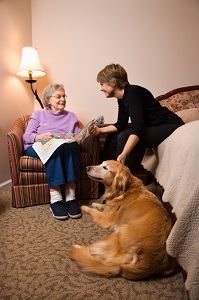 Talk to any pet lover and he or she will tell you that pets make life richer and better. But pets aren’t just a source of fun and an occasional source of extra work. Animals can play important roles in helping people recover from illness, making medical visits less stressful, and relieving social isolation. Although a wide variety of animals have been used in therapeutic settings, therapy dogs are the most popular option, and there’s strong evidence that a therapy dog can make a huge difference in a person’s quality of life.
Talk to any pet lover and he or she will tell you that pets make life richer and better. But pets aren’t just a source of fun and an occasional source of extra work. Animals can play important roles in helping people recover from illness, making medical visits less stressful, and relieving social isolation. Although a wide variety of animals have been used in therapeutic settings, therapy dogs are the most popular option, and there’s strong evidence that a therapy dog can make a huge difference in a person’s quality of life.
What Are Therapy Dogs?
A therapy dog is any dog used in a therapeutic setting to improve treatment outcomes. Some are trained to complete specific tasks, while others are just well-behaved dogs. There’s no specific breed, size, or age requirement for a dog to become a therapy dog. Some are raised and specifically trained to provide therapeutic services, while others are just pets visiting a nursing home or rehabilitation center over the weekend.
What Do They Do?
Therapy dogs are hugely diverse and can fill a wide variety of functions. Some visit people living in nursing homes and respite facilities, providing companionship and a brief opportunity to pet an animal. Others work with children in crisis. For example, some child-abuse centers provide a chance for children to talk to therapy dogs, rather than people, about their abuse. Some prisons have established therapeutic pet-ownership programs in which a prisoner cares for an abandoned or unwanted dog or puppy. Some dogs are highly trained and work as seizure-alert dogs for people with epilepsy or as assistance dogs for people with sensory limitations. Dogs also have been used to help war veterans experiencing posttraumatic stress and other issues. These dogs sometimes undergo years of training before they’re placed with an owner.
What Are the Benefits?
Dogs have a soothing effect on people. The simple act of petting a dog can ease symptoms of depression and anxiety. The benefits of therapy dogs are overwhelming, and include:
- Increasing independence
- Decreasing symptoms of anxiety, depression, and other mental health issues
- Reducing stress
- Improving physical health
- Providing companionship for lonely or isolated people
- Providing a safe opportunity for people—particularly children—to talk about uncomfortable topics
- Providing comfort to people who are anxious about receiving medical care
Can Your Dog Be a Therapy Dog?
There are several organizations that certify dogs as therapy dogs, but not all dogs are certified. Some nursing homes, for example, recruit owners of well-behaved dogs to bring their dogs in a few times a week or month. In most cases, though, your dog will need to pass a temperament test and show no signs of aggression or fear toward people or other animals. Some dogs may need more intense training. For example, therapy dogs that work with children might have to learn how to tolerate being hugged tightly and master the art of not jumping on a rambunctious child.
Guide dogs usually undergo a year or two of training before moving in with a permanent owner. Several organizations recruit families who are willing to put in the time and effort to train a guide dog. However, they have to give up the dog when it’s time for him or her to move in with a permanent owner.
References:
- Getting started. (n.d.). Therapy Dogs International. Retrieved from http://www.tdi-dog.org/About.aspx?Page=Getting+Started
- Perceptions of the impact of pet therapy on residents/patients and staff in facilities visited by therapy dogs [PDF]. (n.d.). Flanders: Therapy Dogs International.
- Walsh, P. G., & Mertin, P. G. (1994). The Training of Pets as Therapy Dogs in a Women’s Prison: A Pilot Study. Anthrozoos: A Multidisciplinary Journal of The Interactions of People & Animals, 7(2), 124-128. doi: 10.2752/089279394787002014
- What is a therapy dog? (n.d.). Therapy Dogs of Vermont. Retrieved from http://www.therapydogs.org/index.php?option=com_content

The preceding article was solely written by the author named above. Any views and opinions expressed are not necessarily shared by GoodTherapy.org. Questions or concerns about the preceding article can be directed to the author or posted as a comment below.

 Ten Ways Pets Can Improve Your Family's Mental Health
Ten Ways Pets Can Improve Your Family's Mental Health Pet Ownership Benefits Mental and Physical Health
Pet Ownership Benefits Mental and Physical Health It Wasn't Me, It Was The Dog
It Wasn't Me, It Was The Dog

Please fill out all required fields to submit your message.
Invalid Email Address.
Please confirm that you are human.
Leave a Comment
By commenting you acknowledge acceptance of GoodTherapy.org's Terms and Conditions of Use.